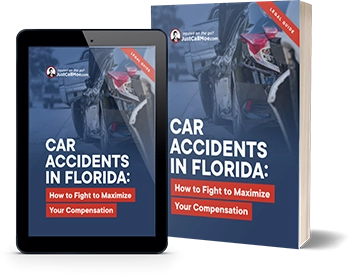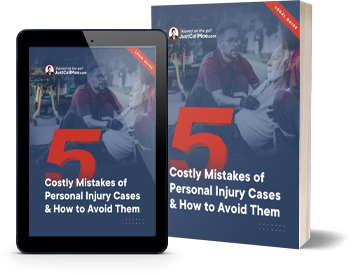Orlando is known for its busy traffic, given the influx of tourists visiting the city’s many attractions.
With so many vehicles on the road, the chances of being involved in a car accident increase. One of the more confusing scenarios is a chain reaction car accident. These accidents can leave those involved wondering who is to blame. The answer is not always simple, as multiple vehicles are involved, and determining fault can be complicated.
A chain reaction accident happens when three or more vehicles are involved in a collision, often triggered by one initial impact that sets off a series of crashes. In the aftermath, insurance claims and legal disputes frequently arise, with each driver pointing fingers. Knowing how fault is determined in such accidents can make all the difference when seeking compensation for damages.
In this blog, our experienced Orlando car accident lawyers will explore how liability is assessed in a chain reaction car accident and what steps you should take if you are involved in one.
The Domino Effect of a Chain Reaction Accident
You are driving along Interstate 4 in Orlando during rush hour. Traffic is moving at a steady pace when, suddenly, the vehicle in front of you slams on the brakes. You manage to stop just in time, but the car behind you is not so lucky. They crash into the back of your car, pushing your vehicle into the car ahead of you. This is the essence of a chain reaction accident—one car’s collision sets off a domino effect, causing multiple vehicles to be involved. In such a scenario, the question is, who is at fault in a chain reaction car accident? To answer this, we need to examine how Florida’s law views these types of accidents.
Initial Impact
The first collision in a chain reaction accident often sets everything in motion. The driver who caused the initial impact typically bears significant responsibility. For example, if a driver was texting and failed to notice stopped traffic ahead, causing them to rear-end another vehicle and trigger a chain reaction, they would likely be considered primarily at fault.
Following Distance
Drivers who fail to maintain safe following distances contribute to chain reaction accidents. Florida traffic laws require drivers to keep enough space between vehicles to stop safely. When multiple drivers follow too closely, they share responsibility for the resulting collisions.
Road and Weather Conditions
Environmental factors can influence fault determination. During Florida’s frequent afternoon thunderstorms, drivers must adjust their speed and following distance accordingly. Failure to adapt to weather conditions can result in partial fault assignment, even if a driver was not directly involved in the initial collision.
Multiple Parties at Fault
In many chain reaction car accidents, multiple drivers share responsibility. Florida follows a pure comparative negligence system, meaning each driver can be assigned a percentage of fault based on their actions. For instance:
- Driver A (front car) – Suddenly brakes without cause
- Driver B (middle car) – Maintains safe distance but gets pushed into Driver A
- Driver C (rear car) – Following too closely, hits Driver B
In this scenario, Driver A might be 40% at fault for unnecessary braking, while Driver C could be 60% at fault for following too closely. Driver B might not bear any responsibility if they followed proper safety protocols.
Role of Insurance Companies and Investigations
Following a chain reaction accident, insurance companies play a pivotal role in determining who is at fault. Each insurance company will investigate the accident, looking at evidence like police reports, witness statements, and any available video footage. They may also assess the damage to each vehicle to determine the sequence of collisions. However, it is important to remember that insurance companies are not impartial. They will often look for ways to minimize their liability and payout. For this reason, it is crucial to have an experienced attorney on your side to advocate for your interests.
Protecting Yourself After a Chain Reaction Accident
If you are involved in a chain reaction accident, there are several steps you should take to protect yourself and your right to compensation.
- Call the police: It is essential to have a police report filed. This report will document the accident, including the sequence of events and any initial determinations of fault.
- Gather evidence: If possible, take photos of the accident scene, including the damage to all vehicles involved and any relevant road conditions. Get the contact information of any witnesses who saw the accident occur.
- Seek medical attention: It is important to be evaluated by a doctor. Injuries from car accidents can sometimes take time to show.
- Contact an attorney: A chain reaction accident can involve multiple insurance claims and legal complexities. Having an experienced attorney on your side will help ensure your rights are protected and you receive the compensation you deserve.
Why Fault Matters in a No-Fault State
Even though Florida operates under a no-fault system for minor accidents, fault still plays a critical role in cases where there are serious injuries or significant property damage. If you are injured in a chain reaction accident, and your medical expenses exceed your Personal Injury Protection (PIP) coverage, you can pursue a claim against the at-fault driver or drivers. In such cases, determining who caused the accident is essential to recovering the full amount of compensation you need. For example, if you sustain injuries that result in medical bills above your PIP coverage, you could file a personal injury lawsuit against the driver responsible for the accident. A chain reaction accident could mean filing a claim against multiple drivers, depending on the circumstances of the crash.
Seeking Legal Guidance After a Chain Reaction Accident
At JustCallMoe, we are here to help. If you have been involved in a chain reaction accident in Orlando and are unsure who is at fault, contact us today. We will work with you to determine liability and ensure you receive the compensation you deserve.

 (866) 225-5663
(866) 225-5663



